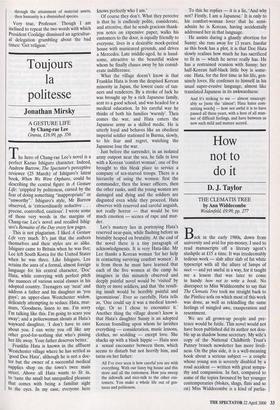Touj ours la politesse
Jonathan Mirsky
A GESTURE LIFE by Chang-rae Lee Granta, ,f16.99, pp. 356 The hero of Chang-rae Lee's novel is a perfect Kazuo Ishiguro character. Indeed, Andrew Barrow, The Spectator's perceptive reviewer (25 March) of Ishiguro's latest book, When We Were Orphans, could be describing the central figure in A Gesture Lift: 'crippled by politeness, cursed by the fear of doing something "inappropriate" or "unworthy".' Ishiguro's style, Mr Barrow observed, is 'extraordinarily seductive . . . precise, controlled, cautious'. I wrote some of those very words in the margins of Chang-rae Lee's novel and recalled Ishig- uro's Remains of the Day every few pages.
This is not plagiarism. I liked A Gesture Life very much. It's just that the authors themselves and their styles are so alike. Ishiguro came to Britain when he was five; Lee left South Korea for the United States when he was three. Like Ishiguro, Lee retains the aura of a formal, almost foreign language for his central character, 'Doc' Hata, while conveying with perfect pitch the nuances of various social classes in his adopted country. Teenagers say 'neat' and address a father and his daughter as 'you guys'; an upper-class Westchester widow, delicately attempting to seduce Hata, mur- murs, 'Goodness, listen to me. I'm sorry I'm talking like this. I'm going to scare you away'; and a policewoman shouts at Hata's wayward daughter, 'I don't have to care about you. I can write you off like any other good-for-nothing slut who's pissing her life away. Your father deserves better.'
Franklin Hata is known in the affluent Westchester village where he has settled as `good Doc Hata', although he is not a doc- tor but the owner of a successful medical supplies shop on the town's twee main street. Above all Hata wants to fit in, to 'taste the small but unequalled pleasure that comes with being a familiar sight to the eyes. In my case, everyone here knows perfectly who I ant' Of course they don't. What they perceive is that he is endlessly polite, considerate, and attentive, that he sends gracious thank- you notes on expensive paper, walks his customers to the door, is equally friendly to everyone, lives in a desirable mock-period house with manicured grounds, and drives a Mercedes. Late middle-aged, he is hand- some, attractive to the beautiful widow whom he finally chases away by his consid- erate indifference.
What the village doesn't know is that Franklin Hata is from the despised Korean minority in Japan, the lowest caste of tan- ners and renderers. By a stroke of luck he was brought up by a rich Japanese family, sent to a good school, and was headed for a medical education. In his careful way he thinks of both his families 'warmly'. Then comes the war, and Hata enters the Japanese army as a skilled medic. He is utterly loyal and behaves like an obedient imperial soldier stationed in Burma, slowly, to his fear and regret, watching the Japanese lose the war.
Just before the surrender, in an isolated army outpost near the sea, he falls in love with a Korean 'comfort woman', one of five brought to this bleak place to service a company of sex-starved troops. There is a hierarchy of using the women: first the commander, then the lesser officers, then the other ranks, until the young women are damaged and dying and the soldiers are disgusted even while they proceed. Hata observes with reserved and careful anguish, not really horror — that would be too much emotion — scenes of rape and mur- der.
Lee's mastery lies in portraying Hata's reserved near-pain, while flashing before us brutality heaped on brutality. At the end of the novel there is a tiny paragraph of acknowledgments. It is very Hata-like. Mr Lee thanks a Korean woman 'for her help in contacting surviving comfort women'. It is from them he must have learned that each of the five women at the camp he imagines in this minutely observed and deeply painful novel would be 'visited' by thirty or more soldiers, and that 'the result- ing insult would be horribly painful and ignominious'. Ever so carefully, Hata tells us, 'One could say it was a medical knowl- edge. Or so I chose to encounter it.' Another thing the village doesn't know is that Hata's daughter Sunny is an adopted Korean foundling upon whom he lavishes everything — consideration, music lessons, clothes, no scolding — except love. She shacks up with a black hippie — Hata sees a sexual encounter between them, which seems to disturb but not horrify him, and turns on her father:
All I've ever seen is how careful you are with everything. With our fancy big house and this store and all the customers. How you sweep the sidewalk and nice-talk to the other cus- tomers. You make a whole life out of ges- tures and politeness.
To this he replies — it is a lie, 'And why not? Firstly, I am a Japanese.' It is only to his comfort-woman lover that he semi- admits he is Korean, having accidentally addressed her in that language.
He assists during a ghastly abortion for Sunny; she runs away for 13 years. Insofar as this book has a plot, it is that Doc Hata slowly realises how much he has sacrificed to fit in — which he never really has. He has a restrained reunion with Sunny; her half-Korean half-black little boy is some- one Hata, for the first time in his life, gen- uinely loves. He confesses to himself in his usual super-evasive language, almost like translated Japanese in its awkwardness:
And it's striking to me — almost unaccept- ably so [note the `almost'; Hata hates com- mitting words] — how not awful it is to have passed all these years, with a host of all man- ner of difficult feelings, and have between us now such mild and mature accord.


























































 Previous page
Previous page